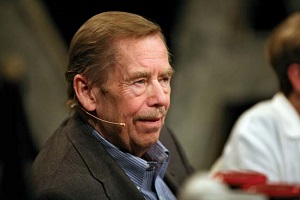De Tsjechische schrijver en politicus Václav Havel werd op 5 oktober 1936 in Praag geboren. Zie ook mijn blog van 5 oktober 2009 en ook mijn blog van 5 oktober 2010 en eveneens alle tags voor Václav Havel op dit blog.
Uit:The Power of the Powerless (Vertaald door Paul Wilson)
“A specter is haunting Eastern Europe: the specter of what in the West is called “dissent.” This specter has not appeared out of thin air. It is a natural and inevitable consequence of the present historical phase of the system it is haunting. It was born at a time when this system, for a thousand reasons, can no longer base itself on the unadulterated, brutal, and arbitrary application of power, eliminating all expressions of nonconformity. What is more, the system has become so ossified politically that there is practically no way for such nonconformity to be implemented within its official structures.
Who are these so-called dissidents? Where does their point of view come from, and what importance does it have? What is the significance of the “independent initiatives” in which “dissidents” collaborate, and what real chances do such initiatives have of success? Is it appropriate to refer to “dissidents” as an opposition? If so, what exactly is such an opposition within the framework of this system? What does it do? What role does it play in society? What are its hopes and on what are they based? Is it within the power of the “dissidents”—as a category of subcitizen outside the power establishment—to have any influence at all on society and the social system? Can they actually change anything?
I think that an examination of these questions—an examination of the potential of the “powerless”—can only begin with an examination of the nature of power in the circumstances in which these powerless people operate.
Our system is most frequently characterized as a dictatorship or, more precisely, as the dictatorship of a political bureaucracy over a society which has undergone economic and social leveling. I am afraid that the term “dictatorship,” regardless of how intelligible it may otherwise be, tends to obscure rather than clarify the real nature of power in this system. We usually associate the term with the notion of a small group of people who take over the government of a given country by force; their power is wielded openly, using the direct instruments of power at their disposal, and they are easily distinguished socially from the majority over whom they rule. One of the essential aspects of this traditional or classical notion of dictatorship is the assumption that it is temporary, ephemeral, lacking historical roots. Its existence seems to be bound up with the lives of those who established it. It is usually local in extent and significance, and regardless of the ideology it utilizes to grant itself legitimacy, its power derives ultimately from the numbers and the armed might of its soldiers and police. The principal threat to its existence is felt to be the possibility that someone better equipped in this sense might appear and overthrow it.”

Václav Havel (5 oktober 1936 – 18 december 2011)
